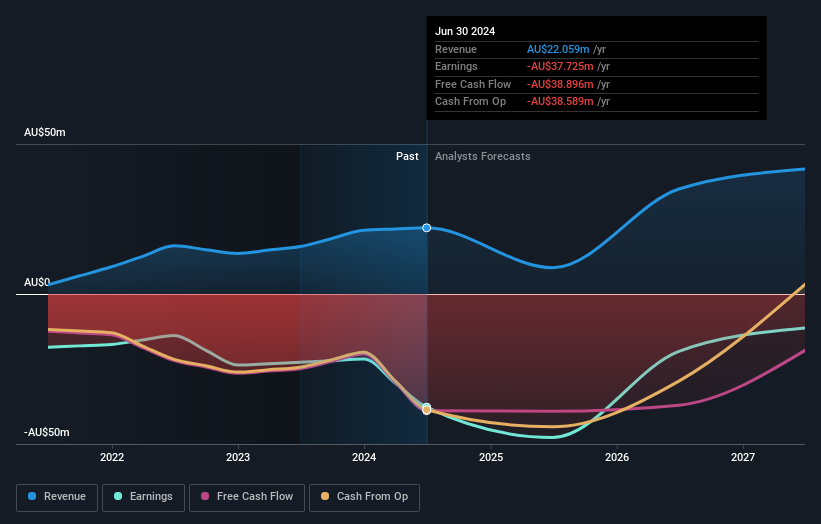Individual investors are PYC Therapeutics Limited's (ASX:PYC) biggest owners and were hit after market cap dropped AU$68m

Key Insights
- PYC Therapeutics' significant individual investors ownership suggests that the key decisions are influenced by shareholders from the larger public
- A total of 9 investors have a majority stake in the company with 50% ownership
- Insiders own 42% of PYC Therapeutics
To get a sense of who is truly in control of PYC Therapeutics Limited (ASX:PYC), it is important to understand the ownership structure of the business. And the group that holds the biggest piece of the pie are individual investors with 48% ownership. In other words, the group stands to gain the most (or lose the most) from their investment into the company.
While the holdings of individual investors took a hit after last week’s 11% price drop, insiders with their 42% also suffered.
In the chart below, we zoom in on the different ownership groups of PYC Therapeutics.
Check out our latest analysis for PYC Therapeutics

What Does The Institutional Ownership Tell Us About PYC Therapeutics?
Institutional investors commonly compare their own returns to the returns of a commonly followed index. So they generally do consider buying larger companies that are included in the relevant benchmark index.
Less than 5% of PYC Therapeutics is held by institutional investors. This suggests that some funds have the company in their sights, but many have not yet bought shares in it. If the company is growing earnings, that may indicate that it is just beginning to catch the attention of these deep-pocketed investors. We sometimes see a rising share price when a few big institutions want to buy a certain stock at the same time. The history of earnings and revenue, which you can see below, could be helpful in considering if more institutional investors will want the stock. Of course, there are plenty of other factors to consider, too.

PYC Therapeutics is not owned by hedge funds. Our data shows that Alan Tribe is the largest shareholder with 34% of shares outstanding. With 4.0% and 3.6% of the shares outstanding respectively, Mccusker Holdings Pty. Ltd. and David Sietsma are the second and third largest shareholders.
We did some more digging and found that 9 of the top shareholders account for roughly 50% of the register, implying that along with larger shareholders, there are a few smaller shareholders, thereby balancing out each others interests somewhat.
Researching institutional ownership is a good way to gauge and filter a stock's expected performance. The same can be achieved by studying analyst sentiments. Quite a few analysts cover the stock, so you could look into forecast growth quite easily.
Insider Ownership Of PYC Therapeutics
The definition of company insiders can be subjective and does vary between jurisdictions. Our data reflects individual insiders, capturing board members at the very least. Management ultimately answers to the board. However, it is not uncommon for managers to be executive board members, especially if they are a founder or the CEO.
I generally consider insider ownership to be a good thing. However, on some occasions it makes it more difficult for other shareholders to hold the board accountable for decisions.
Our most recent data indicates that insiders own a reasonable proportion of PYC Therapeutics Limited. Insiders own AU$238m worth of shares in the AU$560m company. This may suggest that the founders still own a lot of shares. You can click here to see if they have been buying or selling.
General Public Ownership
The general public-- including retail investors -- own 48% stake in the company, and hence can't easily be ignored. While this group can't necessarily call the shots, it can certainly have a real influence on how the company is run.
Private Company Ownership
We can see that Private Companies own 8.0%, of the shares on issue. It might be worth looking deeper into this. If related parties, such as insiders, have an interest in one of these private companies, that should be disclosed in the annual report. Private companies may also have a strategic interest in the company.
Next Steps:
While it is well worth considering the different groups that own a company, there are other factors that are even more important. Be aware that PYC Therapeutics is showing 2 warning signs in our investment analysis , you should know about...
Ultimately the future is most important. You can access this free report on analyst forecasts for the company.
NB: Figures in this article are calculated using data from the last twelve months, which refer to the 12-month period ending on the last date of the month the financial statement is dated. This may not be consistent with full year annual report figures.
New: Manage All Your Stock Portfolios in One Place
We've created the ultimate portfolio companion for stock investors, and it's free.
• Connect an unlimited number of Portfolios and see your total in one currency
• Be alerted to new Warning Signs or Risks via email or mobile
• Track the Fair Value of your stocks
Have feedback on this article? Concerned about the content? Get in touch with us directly. Alternatively, email editorial-team (at) simplywallst.com.
This article by Simply Wall St is general in nature. We provide commentary based on historical data and analyst forecasts only using an unbiased methodology and our articles are not intended to be financial advice. It does not constitute a recommendation to buy or sell any stock, and does not take account of your objectives, or your financial situation. We aim to bring you long-term focused analysis driven by fundamental data. Note that our analysis may not factor in the latest price-sensitive company announcements or qualitative material. Simply Wall St has no position in any stocks mentioned.
About ASX:PYC
PYC Therapeutics
A drug-development company, engages in the discovery and development of novel RNA therapeutics for the treatment of genetic diseases in Australia.
Flawless balance sheet with high growth potential.
Similar Companies
Market Insights
Community Narratives


